Taiwan’s medal tally at the Taipei Summer Universiade yesterday surged to 26 gold medals, 34 silvers and 30 bronzes following extraordinary performances by the nation’s badminton, table tennis and tennis teams on the final day of competition in most sports.
As of press time last night, the nation was third on the medal stable, with Japan first and South Korea second.
In badminton, Wang Chi-ling (王齊麟) and Lee Chia-hsin (李佳馨) won gold in the mixed doubles final. Although they lost the first game 21-12 to Malaysia’s Nur Mohd Azyriyn Ayub and Goh Yea Ching, Wang and Lee secured first place by winning the remaining games 21-16, 21-14.
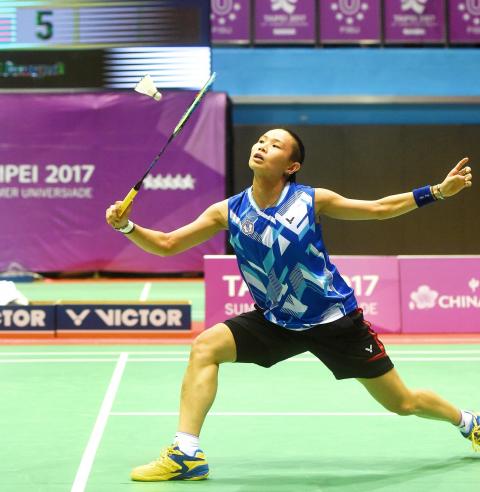
Photo: Fang Pin-chao, Taipei Times
The winning momentum continued as world No. 1 Tai Tzu-ying (戴資穎) clinched another gold medal by toppling South Korea’s Lee Jangmi in straight sets 21-9, 21-13 in 22 minutes.
Tai dominated the gold-medal match, confounding her opponent with various strategies.
Lee Jangmi had lost to Tai in the semi-finals of this year’s Badminton Asia Championships and at the 2012 BWF World Junior Championships.
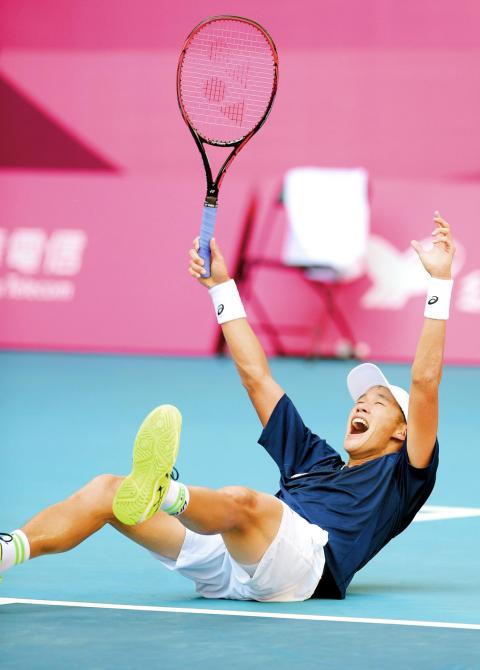
Photo: Chang Chia-ming, Taipei Times
Tai, who won bronze and silver in previous Universiades, did not drop a game on her way to gold in Taipei.
Wang Tzu-wei (王子維) extended the “gold rush” by delivering the nation’s third badminton gold, crushing Japan’s Kenta Nishimoto 21-15, 21-16 in 36 minutes.
Late last night, Hsu Ya-ching (許雅晴) and Wu Ti-jung (吳玓蓉) won the fourth badminton gold of the day in the women’s doubles final against Thailand’s Chayanit Chaladchalam and Phataimas Muenwong.
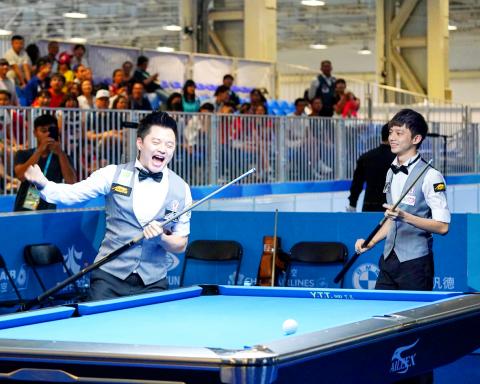
Photo: CNA
Taiwan’s Lee Yang (李洋) and Hsu Ya-ching (許雅晴), and Russia’s Rodion Alimov and Alina Davletova shared bronze in mixed doubles, while Chiang Mei-hui (江美惠) and Malaysia’s Yang Li-lian shared bronze in women’s singles.
In tennis, Jason Jung (莊吉生) reached his goal of winning men’s singles gold at his first Universiade, by beating South Korea’s Hong Seongchan in straight sets. Like Tai, Jung did not drop a set on his way to securing gold.
In the women’s singles, Lee Ya-hsuan (李亞軒) took silver after losing 6-7 (5/7), 6-4, 1-6 to Thailand’s Varatchaya Wongteanchai in a three-hour uphill battle.
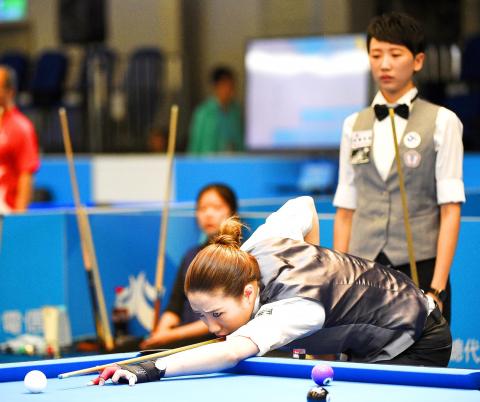
Photo: Chen Chih-chu, Taipei Times
After the loss, Lee Ya-hsuan buried her face in a towel and broke into tears, later saying that she was sorry for letting her supporters down.
“I would be lying if I said I never thought about quitting, but people came and cheered for me. My coach supported me,” she said. “I really had no reason to quit. I would fight until the end, unless I fell on the ground and could not get up.”
In table tennis, Cheng I-ching (鄭怡靜) made history as the nation’s first women’s singles finalist at a Universiade. She took silver after losing to South Korea’s Jeon Jihee 11-5, 5-11, 10-12, 11-7, 9-11, 8-11
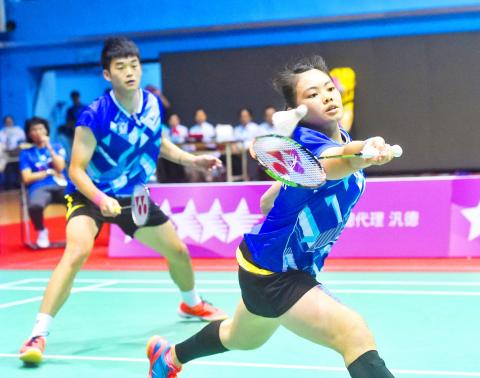
Photo: Fang Pin-chao, Taipei Times
Before Cheng’s feat, the nation’s best record was set by Huang Yi-hua (黃怡樺), who reached the semi-finals in 2009.
Chen Chien-an (陳建安) also had a personal best at a Universiade by reaching the men’s singles final. He took silver after losing to Japan’s Masataka Morizono 6-11, 11-6, 7-11, 8-11, 8-11.
Taiwan yesterday swept the team titles in billiards to add two gold medals.
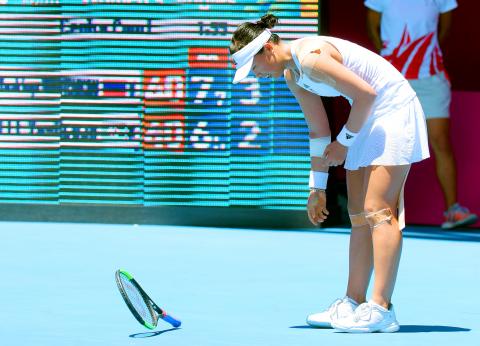
Photo: Chang Chia-ming, Taipei Times
In women’s 9-ball doubles, Wei Tzu-chien (魏子茜) and Kuo Szu-ting (郭思廷) faced off against South Korea’s Jang Yoon-hye and Jeong Eun-su at the Taipei Flora Expo Dome.
Wei, a student at Min Chuan University, and Kuo, who is enrolled at the University of Taipei, have over the past few years competed at the Amway Cup and other international competitions. They racked up a 9-3 win against the Jang and Jeong for the gold.
In wushu, Taiwan’s Hsu Kai-kuei (許凱貴) won gold in men’s combined taolu.
He scored 9.56 for his nanquan routine, which, when added to his 9.62 in nangun on Sunday, secured him first place overall.
In men’s 9-ball doubles, rising stars Ko Ping-yi (柯秉逸) and Ko Ping-chung (柯秉中) took on Japan’s Kengo Suzuki and Takayuki Shishido in the final.
The Ko brothers of coastal Shengang Township (伸港) in Changhua County, who are students at Taipei University of Marine Technology, overpowered their opponents to take a 10-4 victory for gold.
“We are elated to have won the gold medal and hope to build upon this success for good results in future international competitions,” Ko Ping-chung said. “We would like to see more support for the nation’s cue sports players to shine in big events.”
In other billiards finals yesterday, Mongolia’s Narantuya Bayarsaikhan and Uyanga Battulga took home bronze with a 9-3 triumph over Singapore’s Ong Rui-yi and Sarah Wong in women’s 9-ball doubles.
Norway’s Eirik Riisnaes and Matias Saetre prevailed over Singapore’s Leong Jun-jie and Hwang Mo-chi for bronze in men’s 9-ball doubles.
In rounds on Sunday, Taiwan’s Hsu Jui-an (許睿安) beat compatriot Liu Cheng-chieh (劉政杰) 11-3 for gold in the men’s 9-ball singles, while Ku Cheng-chin (古正晴) defeated Mongolia’s Narantuya Bayarsaikhan 9-6 for first place in women’s 9-ball singles.
Lin Shang-yi (林上義), head coach of the nation’s billiards team, said he was satisfied with the results, as Taiwanese athletes pocketed four golds, one silver and one bronze.
“We have proved to everyone at the Universiade that Taiwan is very strong in this event, and we want to improved government policies and public support to help develop cue sports,” Lin said. “Today we have shown that Taiwanese pool players have the capability and determination to give their best when thrust into the limelight, and can prove that we are among the best in the world.”

US PUBLICATION: The results indicated a change in attitude after a 2023 survey showed 55 percent supported full-scale war to achieve unification, the report said More than half of Chinese were against the use of force to unify with Taiwan under any circumstances, a survey conducted by the Atlanta, Georgia-based Carter Center and Emory University found. The survey results, which were released on Wednesday in a report titled “Sovereignty, Security, & US-China Relations: Chinese Public Opinion,” showed that 55.1 percent of respondents agreed or somewhat agreed that “the Taiwan problem should not be resolved using force under any circumstances,” while 24.5 percent “strongly” or “somewhat” disagreed with the statement. The results indicated a change in attitude after a survey published in “Assessing Public Support for (Non)Peaceful Unification

The CIA has a message for Chinese government officials worried about their place in Chinese President Xi Jinping’s (習近平) government: Come work with us. The agency released two Mandarin-language videos on social media on Thursday inviting disgruntled officials to contact the CIA. The recruitment videos posted on YouTube and X racked up more than 5 million views combined in their first day. The outreach comes as CIA Director John Ratcliffe has vowed to boost the agency’s use of intelligence from human sources and its focus on China, which has recently targeted US officials with its own espionage operations. The videos are “aimed at

‘MISGUIDED EDICT’: Two US representatives warned that Somalia’s passport move could result in severe retaliatory consequences and urged it to reverse its decision Minister of Foreign Affairs Lin Chia-lung (林佳龍) has ordered that a special project be launched to counter China’s “legal warfare” distorting UN Resolution 2758, a foreign affairs official said yesterday. Somalia’s Civil Aviation Authority on Wednesday cited UN Resolution 2758 and Mogadishu’s compliance with the “one China” principle as it banned people from entering or transiting in the African nation using Taiwanese passports or other Taiwanese travel documents. The International Air Transport Association’s system shows that Taiwanese passport holders cannot enter Somalia or transit there. The Ministry of Foreign Affairs (MOFA) protested the move and warned Taiwanese against traveling to Somalia or Somaliland
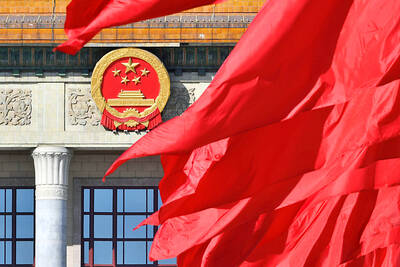
SECURITY: Grassroots civil servants would only need to disclose their travel, while those who have access to classified information would be subject to stricter regulations The government is considering requiring legislators and elected officials to obtain prior approval before traveling to China to prevent Chinese infiltration, an official familiar with national security said yesterday. President William Lai (賴清德) in March announced 17 measures to counter China’s growing infiltration efforts, including requiring all civil servants to make trips to China more transparent so they can be held publicly accountable. The official said that the government is considering amending the Act Governing Relations Between the People of the Taiwan Area and Mainland Area (臺灣地區與大陸地區人民關係條例) to require all civil servants to follow strict regulations before traveling to China.